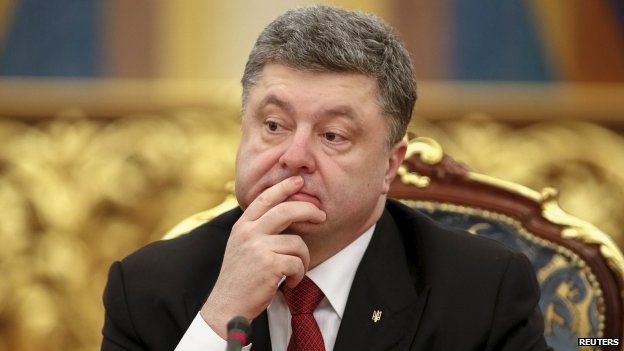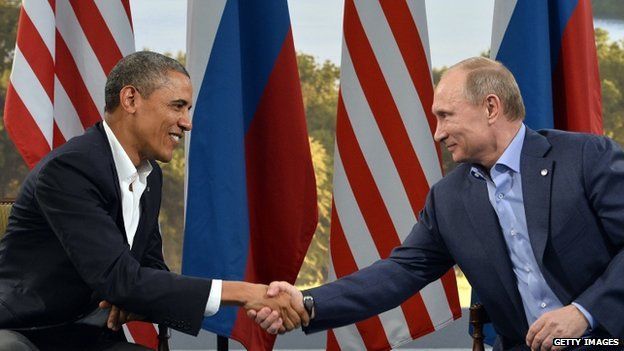How does Russia view the West?
TO SEE VIDEO:
- 2 hours ago
- Europe
If you ask Western policy makers about the main security threats facing Europe, they come up with two: Jihadists from the so-called Islamic State and President Vladimir Putin's Russia.
The threat from jihadists is clear. But why Russia?
Western governments argue that by annexing Crimea and fomenting war in eastern Ukraine, Mr Putin not only violated Ukraine's sovereignty, he challenged Europe's borders and showed himself to be a dangerous and unpredictable leader.
They worry what he might do next.
So far a full-blown conflagration has not materialised.
Since the Minsk peace deal in February, it feels as though the Ukraine crisis has settled into an uneasy standoff.
Talks on the future of eastern Ukraine proceed with little progress. The ceasefire is being breached by both sides, leading to daily casualties.
Though Moscow denies it, Russian military involvement in rebel areas is widely reported and its soldiers have been captured. Western sanctions remain in place. Russia's relations with the West have soured on many fronts.
But there isn't actually a full-scale war going on.

So what should we expect next?
Assessing that is difficult. One reason Western planners are so nervous is because they are unsure how to read Russian intentions.
Reassuring and alarming
So recent comments by Lt Gen Evgeny Buzhinsky, one of Russia's most senior international military negotiators until he retired in 2009, may be helpful.
His long career in the Soviet and then Russian armed forces gave him a frontline role going back to the chilliest years of the Cold War. Now head of the PIR Centre, a prominent military think-tank in Moscow, he is in close contact with his former colleagues on the General Staff and in the Defence Ministry.
His assessment of where we stand is both reassuring and alarming. He rejects the idea of a potential Russian attack on the Baltic states as irrational. No doubt Baltic governments would be wary of taking that at face value.
But it is still interesting to hear a top Russian general argue that it would be foolhardy to attack a country protected by Nato. It suggests the Alliance's Article Five does act as a deterrent - even if some Nato publics seem lukewarm about the idea of coming to other countries' aid.

Gen Buzhinsky also thinks the risk of direct confrontation between Russia and the West has lessened in recent months in part, perhaps, because of the Minsk peace deal.
But he also identifies a shift in Russia's reading of US President Barack Obama's attitude towards arming Ukraine.
"If you supply weapons, then you have to send instructors, and it is a fairy tale that they can be somewhere in western Ukraine training Ukrainians, who then take the weapons and go east," says Gen Buzhinsky.
"Instructors should be on the front line. And if so, there should be casualties, losses, hostages and prisoners. And that would mean direct involvement of the US in the conflict.
"To my mind that is the reason why Obama is so unwilling to send lethal weapons."

Minsk agreement, February 2015
- Immediate and full bilateral ceasefire in eastern Ukraine, to take effect in parts of Donetsk and Luhansk regions
- Withdrawal of all heavy weapons by both sides
- Release of all hostages and other illegally detained people
- Unimpeded delivery of humanitarian aid to the needy, to be internationally supervised
- Constitutional reform in Ukraine, with adoption of a new constitution by the end of 2015

Red line
At the same time Gen Buzhinsky issues a warning: He is very clear that if Kiev were to send troops across the ceasefire line to try to take back eastern Ukraine militarily, it would be a red line for Russia.
"If Kiev starts a major offensive on the pretext that they are being shelled… then Russia might interfere, and that of course will be war."

Of course, some might argue that Russia is already interfering, deeply involved in the Donbass region in what amounts to a secret war.
But Gen Buzhinsky seems to be talking about a full-scale invasion. It's a message he says he includes in all his conversations with Western officials - to get them to persuade Kiev to show restraint.
President Petro Poroshenko of Ukraine insists any move to escalate the conflict is more likely to come from the Russian side.
One further interesting point: In the last year many top Russian military and security figures, including on occasion President Putin himself, have started to argue that the US is out to weaken and dismantle Russia in order to ensure its own supremacy.
This, they claim, is why Russia needs laws to denounce some NGOs as "foreign agents" and to shut down any "undesirable" organisations which are deemed to have overstepped the mark.
'Russia is European'
Yet Gen Buzhinsky does not see the West as his country's natural enemy. He openly dismisses the foreign agent law as "stupid".

Yes, he says, Russia has felt more of a threat from the West in the past two years. But no, he does not see Russia and the US as opponents.
"It is my strong belief that though we occupy part of Asia and part of Europe, Russia is a European country - in our way of thinking and everything. We are much closer to the US and Europe than to China, India and Korea.
"I do not think the Russian people even at the time of the Cold War considered Americans as enemies."
Can Russia and the West be allies? Or is Russia better off going it alone, or turning east?
This is the deeper issue behind the current crisis, which drives policy in Moscow. It is also a fundamental question about Russia's identity and culture which drives a fault line through Russian society.
Gen Buzhinsky's comments reveal that it divides the military elite as well.
- Six questions on Ukraine's ceasefire
- Ukraine crisis: The factory that has been shelled 165 times
- How many Russians are fighting in Ukraine?
- Ukraine ceasefire: New Minsk agreement
- Baltic states shiver as Russia flexes muscles
- Why is east Ukraine hit by conflict?
- Ukraine crisis in maps
- The men fighting with bullets from 1943
- Ukraine crisis: Russia tests new weapons
- Ukraine's most-feared volunteers

No comments:
Post a Comment
Please leave a comment-- or suggestions, particularly of topics and places you'd like to see covered